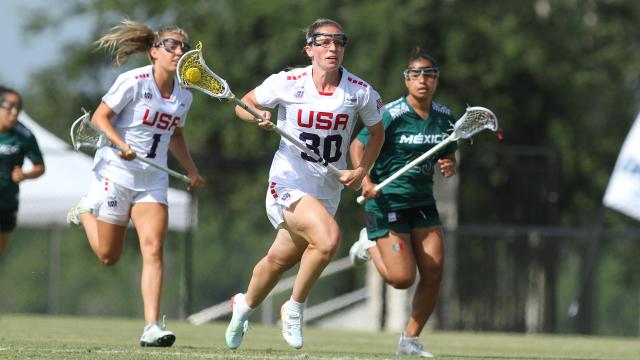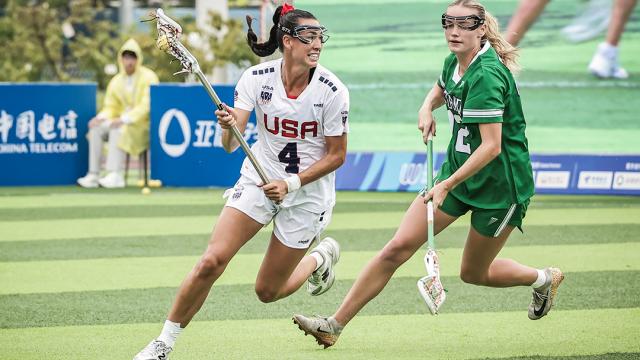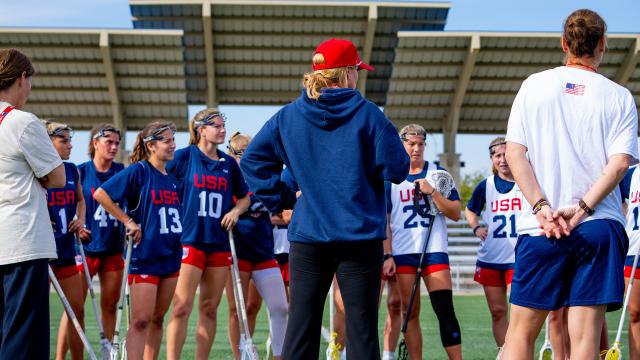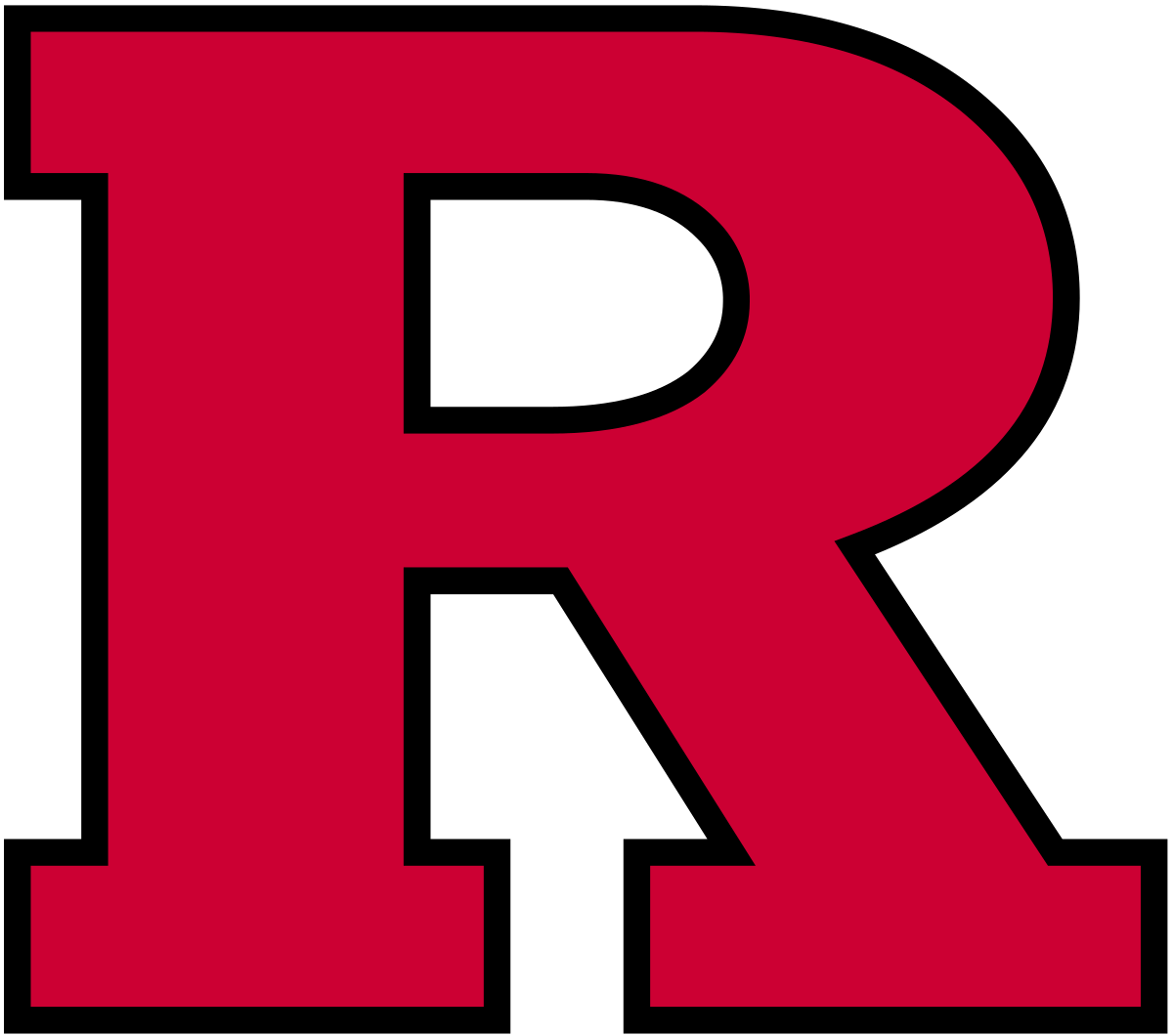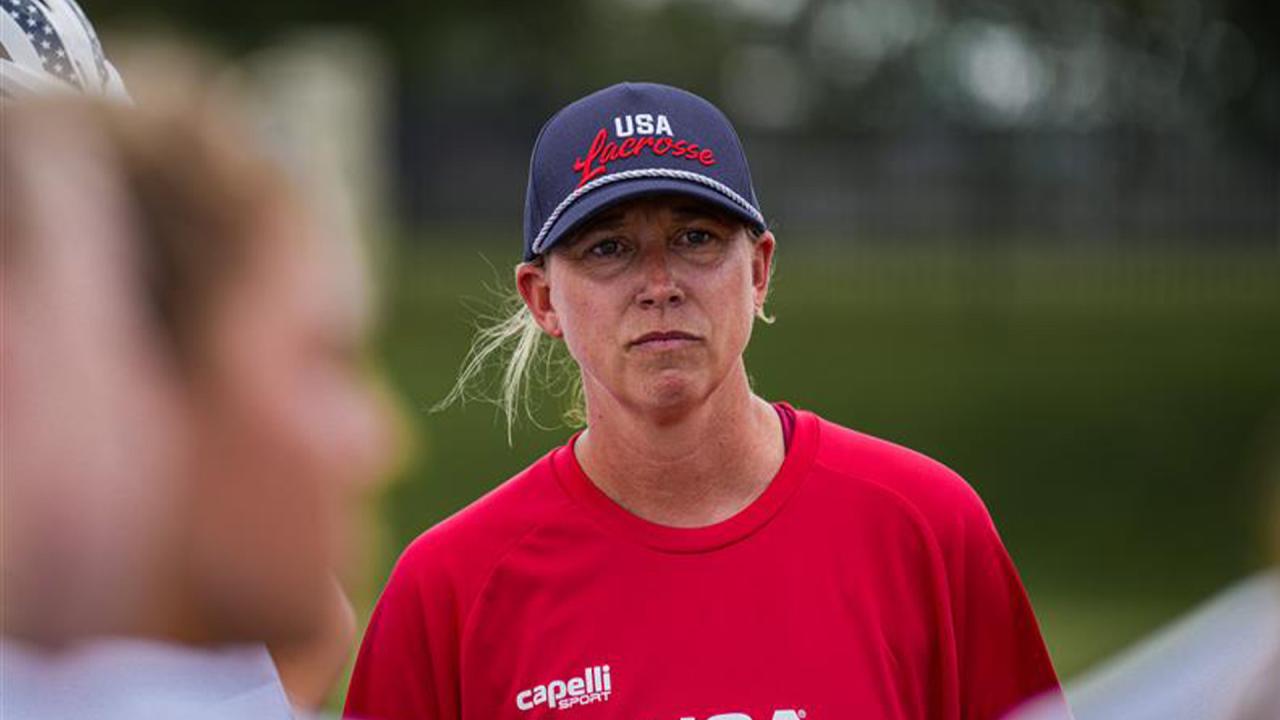
Sleeping Giant: Lehman’s Unconventional Path to U.S. Women’s National Team Staff
The lacrosse coaching community is a small one, and not because the game isn’t growing. But it often appears that everybody knows everybody.
In women’s lacrosse, it’s not hard to draw a straight line to one specific matriarch: Cindy Timchal. Indeed, Tichmal’s vast coaching tree includes some of the greatest players and coaches in lacrosse history, including U.S. Women’s National Team head coach Acacia Walker-Weinstein.
Talk to Walker-Weinstein enough, and you’ll know trust is a value she holds in the highest regard. Familiarity builds and breaks it. So, it wasn’t a surprise when she announced her national team staff.
Kayla Treanor, an All-World selection with the U.S. in 2017 and 2022, was part of Walker-Weinstein’s staff at Boston College for three seasons, helping the Eagles win their first NCAA crown in 2021.
Devon Wills, though a graduate of USC and the Harvard head coach, didn’t fall far from Walker-Weinstein’s tree. They won a world title together in 2009.
Jenn Kent, the associate head coach at Boston College, has spent nearly two decades in Chestnut Hill — a longer tenure than Walker-Weinstein’s.
But one coach’s path to the staff more winding — that of Jersey-born, Penn-bred Rutgers head coach Melissa Lehman, whose initiation to the U.S. team involved getting cut from the U.S. team in the early aughts.
“I love her pedigree,” Walker-Weinstein said. “I like the idea that she has a different circle, a different mindset, a different pedigree, because I want to learn. I want to continue to learn from all these great people.”
Perhaps appropriately, Lehman’s introduction to lacrosse started as something of a high school science experiment. Lehman picked up a stick at 14 years old — later even by “80s babies” standards. As a child, she excelled in basketball and soccer. Like many kids growing up in New Jersey, the Patrick Ewing-led Knicks and fledgling New York Liberty were appointment viewing. And, in a tale as old as time, she adored the '99ers.
Her spring sport was softball, but she planned to pivot to track or take those months “off” to focus on honing hoops skills once she entered Shore Regional High School.
But Maureen Marz, the assistant coach for basketball and soccer, teamed up with Chris Raichle, the head lacrosse coach (and Lehman’s science teacher), to encourage her to try out for lacrosse. Lehman thought, “Why not?” Her mom? She was on board, but not initially in the stands.
“My mom was like, ‘I do everything for you — watch you, follow you, go to all of your games. I’m not going to lacrosse games because I need to go support your brothers,’” Lehman said. “Then, I got pulled up to varsity, and she was like, ‘I guess we’re going to some lacrosse games.’ It’s funny thinking back on it now — lacrosse was something I just picked up.”
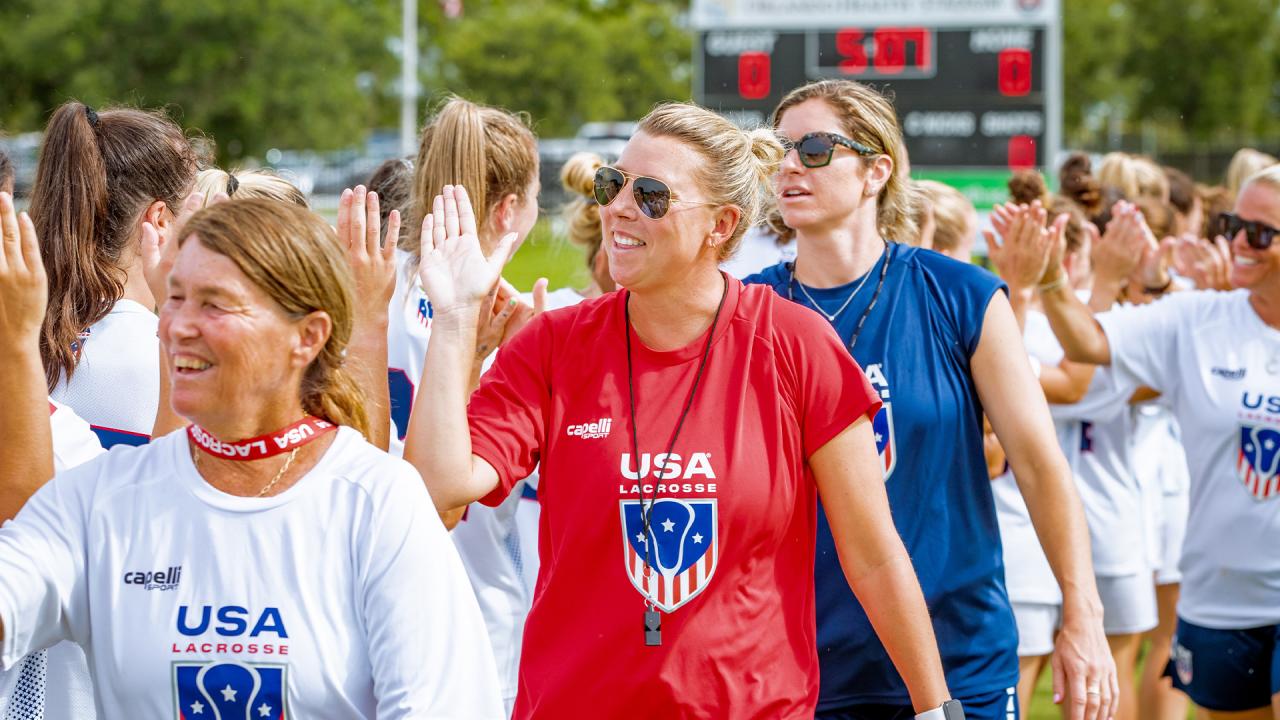
Picked up and ran with all the way to college, though Mom wouldn’t need to travel too far to watch her daughter play. She chose a program with an emerging reputation that matched hers. Penn was coming off its first winning season since 1994 when Lehman arrived on campus in the fall of 2004.
Lehman helped the Quakers win Ivy League titles in 2007 and 2008 and advance to two final fours. During her senior year, the Quakers advanced all the way to the NCAA championship game. She also gained experience working with younger players by coaching camps each summer.
“My class and I at Penn were like, ‘If we don’t have jobs by the spring, we’re going to go all in on lacrosse and do our thing,’” Lehman said.
Like many 2008 graduates, Lehman did not have a job that spring. Despite her All-America status, a playing career wasn’t in the cards. Professional opportunities didn’t exist at the time. She had twice previously tried out for the U.S. team.
“I really wanted that,” Lehman said. “It was a big goal of mine, and, unfortunately, it wasn’t the right time for me. But that’s the pinnacle of this sport.”
To stay involved in the sport she loved at first sight — and enter the workforce in a recession — Lehman needed to take a different path. Former Penn assistant Julie Shaner Young broached the subject of a lacrosse future with Lehman in 2008.
“They were like, ‘Have you thought about coaching?’” Lehman recalled. “That summer, I had a ton of camps lined up and was traveling all over coaching. I was like, ‘Let me look into it.’ I went on an interview at Brown and hit it off with Keely McDonald. We had this awesome connection, and I took the job.”
Lehman coached for a season at the Ivy League rival before returning to her alma mater to coach with Karin Brower for a decade, focusing on midfield and defense. She mentored 10 All-Americans and was tabbed IWLCA Division I Assistant Coach of the Year in 2014.
“I learned so much from Karin as a player, but more importantly, I saw how to build a program, and what that took and how to achieve success in a strong league,” Lehman said. “When I was looking to make a move and become a head coach, I wanted a challenge like that, and I felt prepared from the experience I had as a player and coach, seeing Karin build what she built at Penn.”
For Lehman, that job came in 2019 when Rutgers had an opening. It was also one that moved her back into the Garden State.
“Rutgers, at that time, felt like a sleeping giant in the lacrosse world,” Lehman said. “We're located in such a great location, and the ability to compete in the Big 10 was exciting — the caliber of coaches I’d get to compete against every season.”
Rutgers, at that time, felt like a sleeping giant in the lacrosse world.
Melissa Lehman
Rutgers quickly woke up, advancing to the Big Ten semifinals for the second time in program history, earning its first bid to the NCAA tournament since 1999 and securing the program's first-ever win in the tournament, 16-13 over Drexel. For an encore in 2022, Rutgers won a program-record 16 games, made it to the Big Ten final after upsetting Northwestern and snagged another NCAA tournament first-round win.
Lehman was making a name for herself that was all her own in the coaching world. But she never stopped putting herself out there. She didn’t feel she had to prove herself because she wasn’t an All-American at Maryland. But she knew she had to make connections and keep the thirst for knowledge — the joy in experimentation — that drew her to the game in the first place.
“People, whether they were administrators or coaches, always told me to find new ways to network and expand my knowledge, get involved in different things,” Lehman said. “You never know if someone you meet on a committee is going to go to a different university, and you’ll cross paths.”
Lehman has been involved in the IWLCA mentor and All-American committees, for instance. In 2023, Northwestern coach Kelly Amonte Hiller, an adversary in the Big Ten, called Lehman to be an evaluator for the U20 Women’s National Team that went on to win gold in Hong Kong, China, last summer.
“I jumped at the opportunity to be in that room,” Lehman said.
Her journey had finally landed her a spot with the U.S. program that eluded her in college. Then, last fall, Walker-Weinstein came calling.
“I wasn't sure what she wanted to talk about because we hadn't really talked much before,” Lehman said.
But Walker-Weinstein had been doing her homework.
“When you talk to her players, they love and respect her, and I don’t think [Penn senior associate head coach] Kerri Whitaker and Karin Brower would hold on to her as long as they did and do so well if they didn’t love her. I have a lot of respect for those two as well. And I’d ask friends and friends of friends, ‘What’s the deal? What’s the scoop? What’s she like?’ No one had a bad thing to say. No one even had a yellow flag. Everyone was like, ‘She’s a winner. She’s awesome. I could see you working well together.’”
The two work well together, in part because, although they come from different coaching trees, they share a common language.
“When Acacia and I spoke about her vision, she talked so much about how she cares about the team and helping the players grow,” Lehman said. “That’s something I am aligned with.”
But Walker-Weinstein also wanted a coach who would challenge her to push past her own comfort zone. Lehman was the woman for the job.
“She has a unique outlook on the game,” Walker-Weinstein said. “She has an aggressive outlook, and her lingo is different. Her slides are different, and it’s good to be thinking differently. We’re trying to get outside of what we do at BC and learning to trust and go out on a limb.”
In the end? “I trust Melissa, and that’s the most important thing,” Walker-Weinstein said.
Of course, the strategy piece also matters, and Lehman can go out on several different limbs and throw different looks at opponents because of her pedigree.
“I’ve coached a lot of different styles in the past — I coach zone, I coach man, and I have that passion and love for defense that was instilled in me by Karin,” Lehman said. “Everything I learned about building a great team from her is what I hope to bring to the national team.”
Lehman has spent decades being an underdog in lacrosse. But the U.S. program is far from one. Lehman helped the team to the gold medal in the Pan-American Women’s Lacrosse Championship earlier this week, and as the four-time defending world champion, the U.S. will be favored to five-peat in 2026.
Lehman is embracing that role.
“The ultimate goal is for us to bring back the gold medal as we look toward next year,” Lehman said.
But she’s not straying too far from her team-building (or science-adjacent) roots.
“We are trying to create a team that gels and has great chemistry,” Lehman says. “We have some of the fastest, most athletic players in the world, and we want to create a team that has a presence about them and has a fun time playing together.”
Beth Ann Mayer
Beth Ann Mayer is a Long Island-based writer. She joined USA Lacrosse in 2022 after freelancing for Inside Lacrosse for five years. She first began covering the game as a student at Syracuse. When she's not writing, you can find her wrangling her husband, two children and surplus of pets.

Related Articles
